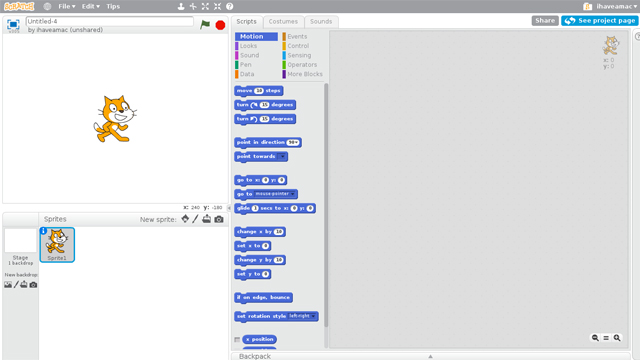Learning From Scratch
Over the last few terms, Andrew’s been helping kids at his local school learn how to code with Code Club. How did he find teaching a group of 9, 10 and 11 year olds the basics of Scratch?
If you’ve never stood in front of a class full of children before it can be a daunting prospect, especially if your only experience of a classroom was terrorising teachers during your own school days. But standing at the head of a classroom I was. So I took a few deep breaths and reminded myself that the kids had chosen to be there and they were now looking to me to help them learn to code with Scratch.

Scratch
Scratch is a specially designed programming language to teach children how to create their own interactive stories, games and animations. Code Club, the organisation that mobilises volunteers to lead after-school coding clubs, provide excellent materials to teach Scratch to the kids and was the reason I was about to embark on 3 terms of teaching coding to year 5s and 6s.

Digital Natives
One of the most exciting things to come out of my regular classes, was that the majority of the children were really up for learning about coding having grown up with the internet, smartphones, tablets and apps as part of their everyday lives. This meant that they dived straight in and tried things out - exploring all the possible features available to them and even downloading Scratch at home to continue their projects. It was thrilling to see them adopt it so quickly.
“They dived straight in and tried things out - exploring all the possible features available to them and even downloading Scratch at home to continue their projects. It was thrilling to see them adopt it so quickly.”
However, what I found when trying to teach the kids Scratch, was their eagerness to explore the possibilities of the language slowed them down in their progress and learning. This called for a bit of extra guidance and a helpful worksheet which encouraged the kids to tick off each step as they completed it. Having grasped the basics, and with the help of the sheets, progress quickly ensued and they were able to start expressing their creativity and ideas through code.
Fail to prepare, prepare to fail
In terms of my own learning, I discovered that good preparation, encouragement and engagement was key to my success as a teacher and the children’s success as learners.
Preparation
Being able to refer them to the handy reference cards, use interactive whiteboards when explaining difficult concepts, having worksheets ready and familiarising myself with the school network, made the classes run more smoothly and the children able to get straight on with programming every week when they entered the classroom. What do they say? Fail to prepare, prepare to fail.
Encouragement
When the kids got stuck, which they invariably did, I found it was best to remind them of a previous piece of code that they could adapt to achieve their goal. It also helped not to spoon feed the answers but lead them to the solution by questioning their thought process.
Engagement
Questions became key to keeping the children alert and attentive and to get their minds thinking like coders. The questions that I used most frequently were:
- What to you think will happen when you demonstrate this?
- What might you do to change or improve your project?
- How do you think you can achieve this?
It’s pointless trying to second guess a child’s answer to these questions and I was frequently surprised, and delighted, by the answers I did receive. For me, it was a fascinating privilege to have their thought process revealed in this way and when a child comes to a solution on their own it’s the most rewarding outcome, and the best encouragement for the rest of the class to continue experimenting.

The future’s bright
Now that we’ve broken up for the summer holidays, and my time with this group of children has come to an end, I’m able to reflect on the year that has passed. I really hope that the kids I’ve taught have caught the bug and will have the opportunity to progress onto more complicated projects as they move up to “big school”.
As for me, I am really looking forward to continuing volunteering and teaching Scratch through Code Club to a new class of potential young coders when the school term starts again in September.
“It was a fascinating privilege to have their thought process revealed in this way and when a child comes to a solution on their own it’s the most rewarding outcome.”
From my fearful beginnings I have come to realise that when kids are excited to learn, and the teacher happy to introduce them to the concepts and stand back and let them discover their creativity, you reap the rewards of watching them fly.
